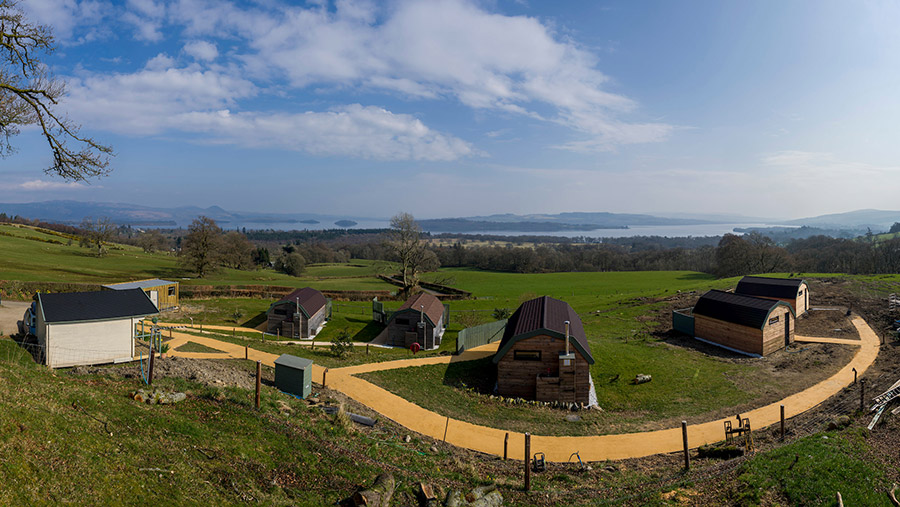Scottish agritourism sector poised for continued expansion
 © Lennox of Lomond
© Lennox of Lomond Continued expansion of Scottish agritourism and on-farm retailing could see its combined value hit £250m, supporting 10,000 full-time jobs by 2030, according to new research for the Scottish Agritourism group.
The inaugural Scottish Agritourism Growth Tracker was undertaken to gain a better understanding of the sector’s value and potential, following a three-year Monitor Farm programme.
It found that, as well as the opportunity for strong economic growth, agritourism has played an important role in sustaining and creating rural jobs, supporting vital family employment, and providing equal and inclusive roles for men and women across various ages and skill levels.
See also: Campaign urges city dwellers to visit Scottish farms
“In recent years, particularly during the pandemic, an increasing number of farms, crofts and estates have developed their operations to attract visitors,” said a Scottish Agritourism spokesman.
“A growing interest in connecting to nature and an awareness of food and drink journeys have created new opportunities, while offering seasonal events – such as lambing sessions and pumpkin festivals – have helped inspire visitors to visit and find out about life on a working farm.”
Key highlights from the research show that:
- Agritourism provides an opportunity for multigenerational income, retaining on-farm careers and employment
- It can help add value to farm produce by selling directly to visitors
- Farm tours and accommodation are the most common activities by those involved in agritourism
- Farm retail businesses have more female directors and business partners than farm-only businesses.
“The development of the growth tracker highlights that agritourism can play an important part in building resilience within rural Scotland,” said Scottish rural affairs secretary Mairi Gougeon. “It has an increasing part to play in our vision of Scotland as a good food nation.”
In particular, the research identified accommodation, food and drink, and event spaces as potential growth areas within the agritourism sector.
Caroline Millar, sector lead at Scottish Agritourism, said the aim was to double the number of farms and crofts in the sector, with a focus on increasing food and drink experiences on farms.
A new “strategy for sustainable growth”, launched by the Scottish government in November last year, should help in this endeavour.
Case study 1: The Bus Stop, Gifford, East Lothian
Balfour Stewart runs one of the community groups that has been involved in the Scottish Enterprise agritourism Monitor Farm programme for the past three years.
The Bus Stop was launched as a way to increase income when Mr Stewart’s son wanted to come home and farm. Being only an 80ha arable farm, it could not support more than one salary.
Off the back of that, three luxury buses were purchased and refitted to create novel accommodation, complete with electricity, heating, rain showers and wood-fired hot tubs.
Another site now houses six “eco buses”, which have no power, but include log-fired stoves and hot tubs. There’s a communal toilet block, a bus café, as well as a play bus for children.
Mr Stewart says the project has provided all the support they need, delivering both financial security and companionship.
While people may opt to go abroad again after the pandemic, he believes short “staycations” are here to stay, while being involved in the monitor programme has been a “win win”.
Case study 2: Lennox of Lomond
Kay Wilson and her family run one of the two Monitor Farms at Lennox of Lomond, near Luss in west-central Scotland.
The family knew they were going to lose a chunk of their subsidy after Brexit and needed to become self-sufficient.
They started with letting two farm cottages, a bed and breakfast and small farm tours for a lambing experience. It was going well when they were challenged with Covid.
The money they had made in their first year was reinvested in a special trailer that pulled behind the quad bike for a bespoke tour of their 1,620ha.
On the back of this, the family now has a contract, worth about £30,000, with a US-based tour company until 2024. They will give weekly farm tours, along with sheepdog and cookery demonstrations.
Ms Wilson says their passage has been made much easier with help from Scottish Agritourism and the community groups.
